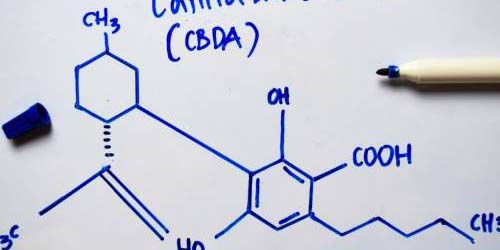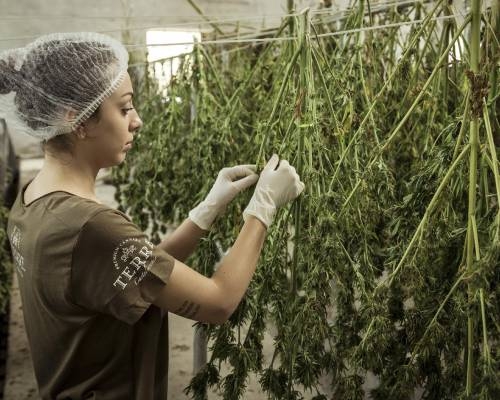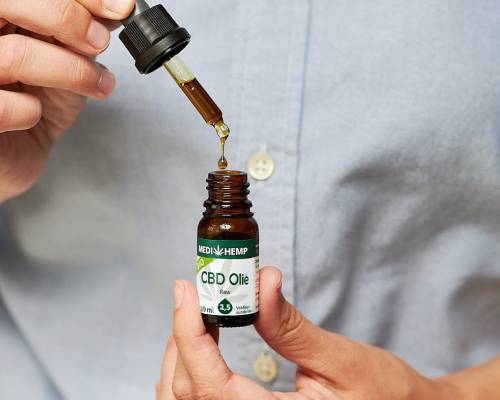
CBDA is an acid form of CBD. Naturally, CBDA only occurs in hemp and cannabis plants. Cannabidiolic acid, as the substance is called in full, must be heated to obtain CBD. Don't you? Then you can benefit from the effect and properties of CBDA, which are definitely different from those of CBD.
What is CBDA?
CBDA is therefore the acid form of CBD. The 'A' stands for Acid, which means acid. The substance is therefore called Cannabidiolic Acid or Cannabidiolic Acid. CBD is not the only substance that comes from an acid form. THC, which we all know as the high-enhancing compound in cannabis, comes from tetrahydrocannabinolic acid (THCA). For example, there are even more cannabinoids in weed that arise from an acid form. They are, as it were, the raw ingredients in hemp and cannabis plants. By decarboxylating (heating) these molecules, you can obtain active substances such as THC and CBD.
Tetrahydrocannabinol (THC)
THC (Tetrahydrocannabinol) is responsible for especially the mind-expanding and psychoactive effects of marijuana. CBD (Cannabidiol) in itself is not psychoactive and reduces the THC effect of being stoned or high. Both cannabinoids have properties that are experienced as curative and both are used by people with a variety of complaints. THCA and CBDA have a slightly different effect on the human body and can therefore be used differently.
THC Versus CBD
Traditional cannabis is mostly produced with a focus on a high THC level and hardly has any CBD. Industrial hemp, however, contains a lot of CBD and very little THC and is the base of the currently available CBD products. New marijuana strains with a higher CBD content and a lower THC content gradually gain more terrain among the home-growers.

CBDA Effect
Let's make one thing clear about the effect of CBDA: the substance does not make you high. You can take it with confidence if you don't want to get stoned. Furthermore, the CBDA effect is slightly more complicated than with CBD and THC. The known cannabinoids bind to receptors (CB1 and CB2) in the endocannabinoid system in our body. CBDA works differently. It has an inhibitory effect on the COX-2 enzyme [1]. That enzyme affects inflammation after injuries that cause pain. We cannot say whether CBDA is really pain-inhibiting and needs to be further investigated.
Just like CBD, CBDA has an anti-inflammatory effect [2]. There are signals from animal studies that it can affect the serotonin balance in the body [2]. Another possible effect of CBDA is that it is effective in depression and can counteract nausea. Please note: many of these alleged CBDA effects still require further investigation. These are just results from recent scientific studies.
CBDA Interaction with Anandamine
The effect of cannabinoids such as CBD and CBDa is explained because of the fact that cannabis and cannabinoids look exactly like the endogenous cannabinoid system, a discovery made in the 90's. This system produces the neurotransmitter Anandamine in the brain - this word is derived from the word Amanda which means bliss. Cannabinoids from cannabis such as THC, CBD and CBDa interact with Anandamine which result in a physiological reaction, just like a pain stimulus or a shock reaction. Dosage, time of intake and the relation CBD, CBDa and THC is important for the final effects of CBD and CBDa.
Buy CBDA Oil?
Are you interested in how CBDA works and do you want to buy supplements that contain this substance? Then you can choose from a number of things. You can buy CBDA oil or capsules that contain cannabidiolic acid. Pastes are also sold with very high CBDA levels. However, you can also choose to buy RAW or Full Spectrum CBD oil. Heat is not used to enrich this type of CBD oil. As a result, the raw component, CBDA, is also preserved in the oil. With Wedihemp CBD Oil RAW, for example, you also benefit from the properties of CBDA.

RAW CBD Oil from Medihemp
Want to know more about Cannabinoids such as Cannabidiolic Acid?
Do you find the story behind Cannabidiolic acid interesting and do you want to know more about cannabinoids? Check out some of these blogs!
- CBD oil Frequently Asked Questions about Cannabidiol
- Decarboxylation - This is how you get (more) THC in your Cannabis Edibles!
- Difference between THC Oil, Cannabis oil, CBD oil, marijuana oil
- Buying CBD Oil? This is what you need to know
- CBD Oil Dosage | Quick tip
Sources:
[1] “Cannabidiolic acid as a selective cyclooxygenase-2 inhibitory component in cannabis” Pubmed (US National Library of Medicine National Institutes of Health).
[2] “Cannabidiolic acid prevents vomiting…” Pubmed (US National Library of Medicine National Institutes of Health).
[3] “Effects of cannabinoids Δ(9)-tetrahydrocannabinol, Δ(9)-tetrahydrocannabinolic acid and cannabidiol in MPP+ affected murine mesencephalic cultures”. Pubmed (US National Library of Medicine National Institutes of Health).